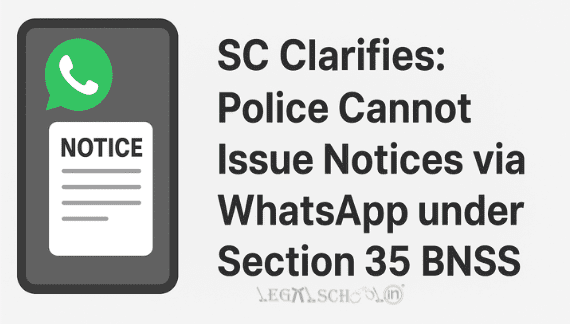Roadmap
ToggleSupreme Court Distinguishes Judicial and Executive Functions
In a landmark judgment, the Supreme Court of India has ruled that police and investigative agencies cannot serve notices to an accused via WhatsApp or other electronic means. The ruling draws a vital distinction between judicial acts and executive acts, reinforcing constitutional safeguards under Article 21.
Judicial vs. Executive Acts
The Bench of Justices M.M. Sundresh and N.K. Singh observed:
- A summons issued by a court is a judicial act.
- Notices issued by investigative agencies are executive acts.
- Therefore, the procedure prescribed for courts under the Bharatiya Nagarik Suraksha Sanhita (BNSS), 2023 cannot be extended to executive agencies like the police.
Haryana’s Argument & SC’s Response
The Haryana government argued that since BNSS 2023 permits electronic service of process in court proceedings, the same should apply to police-issued summons.
The Supreme Court rejected this plea, clarifying that:
- Electronic communication provisions apply only to judicial summons, not executive notices.
- Summons to an accused must be served physically and personally, ensuring compliance with procedural safeguards.
Protection of Liberty under Article 21
The Court emphasized that:
- Personal liberty is a fundamental right, and any dilution of procedure affects this right.
- Notices issued electronically could undermine safeguards guaranteed under Article 21 of the Constitution.
- Procedural ease through technology cannot override constitutional protections.
Key Takeaways from the Ruling
- WhatsApp and electronic notices are valid for court summons under BNSS 2023 but not for police or investigative agencies.
- Distinction between judicial and executive functions is constitutionally significant, not a mere technicality.
- Police must serve notices physically, ensuring proper compliance and protection of the accused’s rights.
Why This Matters
This ruling serves as a reminder to law enforcement officers, legal professionals, and compliance leaders that procedural safeguards are not optional. They form the backbone of constitutional due process, especially when personal liberty is involved.

